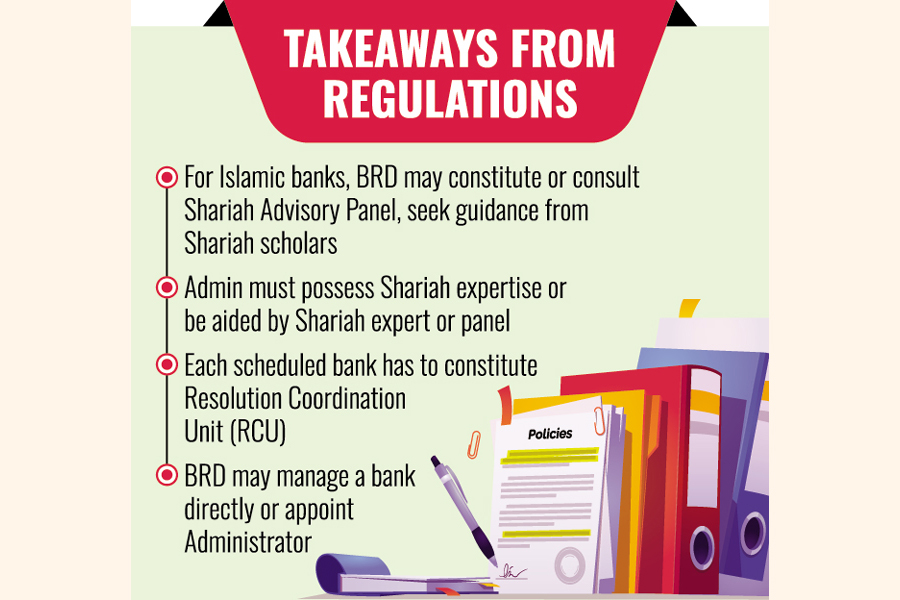
Published :
Updated :

A clearly defined drive begins in acquisitions and mergers of problem banks as the regulator Thursday issued regulations for the Bank Resolution Ordinance 2025 made by the interim government for banking-sector reforms.
Officials said the regulations, rolled out by Bangladesh Bank-- the central bank--made the rules "more practical, operational, and effective, with clearly defined objectives and responsibilities".
Every act or ordinance requires corresponding rules and regulations to provide detailed modus operandi and clearer interpretations.
Accordingly, the regulations have been prepared to ensure smooth implementation of the Ordinance. The Board of Bangladesh Bank approved the set of rules.
People familiar with the developments at the central bank told the FE that they may issue further guidelines to make the ordinance far more clear and operational.
"We will issue more guidelines once we feel urgency to explain the ordinance," said one central banker.
This regulation shall be called "The Regulations for Bank Resolution 2025" and it shall come into force on the date of its publication.
The objectives of this regulation are to ensure that bank resolutions are executed effectively, efficiently, and in an orderly manner.
The Bank Resolution Department (BRD) of the Bangladesh Bank is designated as the Resolution Authority under this legal instrument.
From now on, the BRD, from time to time, will issue guidelines, circulars, or directives to clarify or implement the provisions of this Regulation.
For resolution actions involving Islamic banks, the BRD may constitute or consult a Shariah Advisory Panel and seek guidance from qualified Shariah scholars to ensure that all actions, instruments, and transfers remain Shariah-compliant without compromising timeliness or effectiveness.
Each scheduled bank will constitute a dedicated Resolution Coordination Unit (RCU) to ensure day-to-day coordination of all resolution-planning activities.
The RCU will be headed by a senior official of at least Deputy Managing Director (DMD) rank.
The takeaways from the regulations further provide that banks "must maintain strict confidentiality regarding BRD instructions and the contents of resolution plans, except where disclosure is explicitly authorised by BRD".
Unless the BRD decides to manage the bank directly, it (BRD) will appoint an Administrator under Section 16(1)(ka) and Section 20(1) of the Ordinance, using Schedule D in Administrator Appointment Form.
For Islamic banks, the appointed administrator must meet fit-and-proper criteria and possess adequate Shariah expertise or be supported by a qualified Shariah expert or panel.
The appointed Administrator will assume overall responsibility for managing and facilitating the resolution activities of the bank under resolution process, in alignment with the resolution strategy prepared by the BRD.
The Bank Resolution Department will oversee the administrator's performance on the cusp of the transition.
The administrator will serve as the final authority within the temporary administrative structure of the bank for all operational and strategic decisions.
The go-between will prepare an inventory of all assets and liabilities of the bank in accordance with Section 23 of the Ordinance and submit it to the watchdog (BRD).
With BRD approval, s\he will appoint an independent auditor to conduct a comprehensive review of the bank's assets and/or liabilities and submit a detailed report.
The admin will prepare and submit periodic reports to the BRD on the financial condition of the bank, as specified by the department.
The post-uprising government framed the ordinance mainly for the merger of troubled banks, including Sharih-based ones.
Currently five such banks -- Exim Bank, SIBL, First Security Islmi Bank, Union Bank and Global Islami Bank -- are under merger process.
Meanwhile, the central bank has established the Bank Resolution Department to facilitate the process. It also appointed administrator for the banks to be amalgamated into one.
The five banks have capital shortfall of at least Tk 350 billion. The government might inject funds along with development partners.
The offshoot might be the country's first state-owned Shariah-based bank named United Islami Bank.
jasimharoon@yahoo.com


 For all latest news, follow The Financial Express Google News channel.
For all latest news, follow The Financial Express Google News channel.